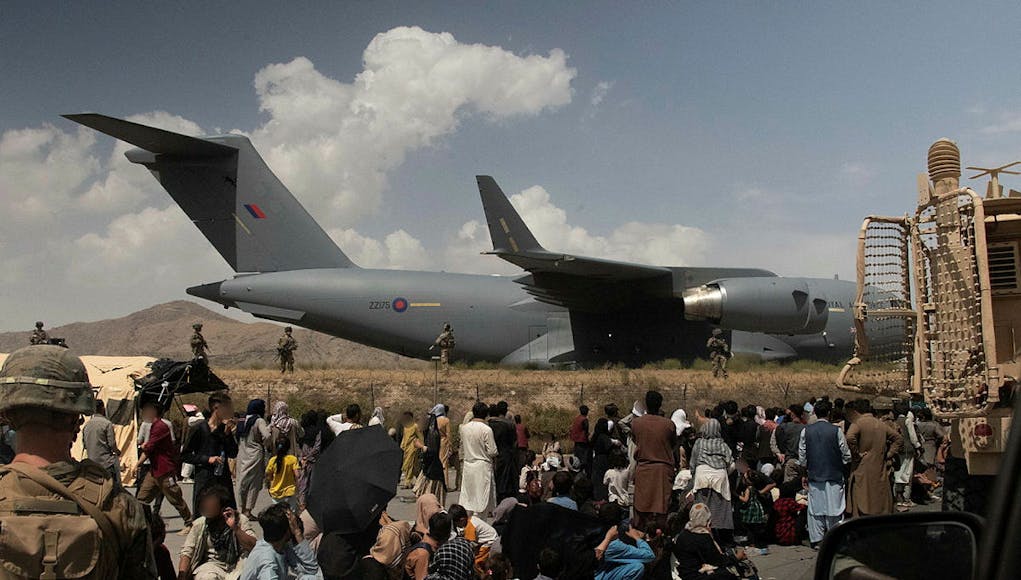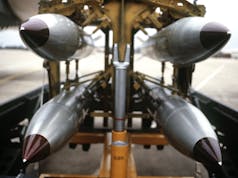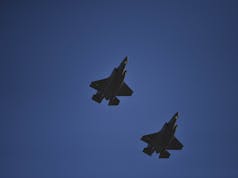Two years have passed since Operation Pitting was executed, marking one of the most significant and heart-wrenching humanitarian evacuations undertaken by British forces.
The operation brought over 15,000 individuals to safety, but the bittersweet truth of the evacuation is echoed in the challenges faced and the lives irrevocably altered.
Operation Pitting was set into motion in the aftermath of the rapid Taliban takeover of Afghanistan in August 2021. Over 1,000 British military personnel, predominantly from the 16 Air Assault Brigade, were deployed to facilitate the airlift. The intensity of the mission was a testament to the dedication and resolve of the British forces, executing the largest British evacuation since World War II and the most significant airlift since the Berlin Blockade of 1948-49.
Of those who found refuge under the operation, 5,000 were British nationals. The majority, however, were Afghans vulnerable to Taliban retribution for their support to British forces during Operation Herrick. These evacuees, including 2,200 children – one as young as a day old – now had an uncertain journey ahead in unfamiliar lands.
The operation bore witness to moments of utmost despair, especially when the airport in Kabul became a harrowing backdrop for desperation, as Afghans clung to departing flights, leading to tragic fatalities. The onset of the operation saw British military personnel, alongside US troops, manoeuvre through intense challenges in a rapidly changing situation. Reports of Taliban obstruction and atrocities against those trying to reach the airport were rampant. The attacks, particularly the devastating suicide bombing outside the airport that killed scores, added a grim shade to the already fraught situation.
Reports like those of Sky News Chief Correspondent Stuart Ramsay painted a vivid picture of the situation on the ground, with lines of British paratroopers shielding evacuees and Taliban fighters intermittently aiding and intimidating the masses.
The commitment of British forces extended beyond the borders of the airport. Special forces reportedly scoured Kabul, searching for those who couldn’t make it to the airport due to Taliban blockades. However, as the operation neared its completion, the words of Chief of the Defence Staff Sir Nick Carter resonated deeply: it was “heartbreaking” to leave anyone behind.
Two years later, it’s crucial to recognise the unparalleled efforts of the RAF, which undertook more than 100 evacuation flights, covering 261,000 miles. Memories of a C-17 flight carrying 436 people, thrice its designed capacity, encapsulate the spirit of Operation Pitting – pushing boundaries for humanity.
Yet, as we remember this feat, the lingering thought remains about those left behind. Talks with the Taliban about their safe passage continue, but the future remains uncertain for many. Operation Pitting was laden with challenges and controversies. From chaotic scenes at Kabul airport to heart-wrenching stories of desperate families trying to escape, the world witnessed an immense human tragedy.
Brief Timeline of Operation Pitting
The operation was announced on the 13th of August 2021.
- 15th August:
- British military arrive in Kabul.
- Kabul falls to the Taliban.
- 16th August:
- First evacuation flight lands at RAF Brize Norton.
- Chaos at Kabul airport.
- 17th August:
- US and allies secure the airport.
- 18th August:
- Taliban set up airport checkpoints.
- 19th August:
- UK policy on unattended children announced.
- 20th August:
- UK Special Forces activity reported in Kabul.
- 21st August:
- Deteriorating situation at the airport.
- 22nd August:
- ISIL-KP threats emerge.
- 23rd August:
- “Race against time” announced by Defence Secretary.
- 24th August:
- G7 discusses Afghanistan.
- 26th August:
- Suicide bombing at Kabul airport.
- 27th August:
- UK begins concluding evacuation.
- 28th August:
- Last civilian flights depart.
- 31st August:
- Final British military flight leaves Kabul.














Reasons why we should never again support an enduring operation in support of US foreign policy.
Nor try nation building on the other side of the planet.
The UK and the west are completely incapable of nation building anymore, we are too soft and try and foster social change that the population is unwilling to accept.
Britain built an empire primarily on the basis of accepting the local customs and facilitating industry to produce and extract local resources. Which worked pretty well.
What we thought we were going to achieve in Afghanistan by pissing money up the wall on women only theme parks while our soldiers were being slaughtered by mountain men with attitudes from 1000 years ago is beyond me.
Best leave it to China, they are much more suited to this than the west could ever be now.
There is much in what you say. But there is one interesting counter-example. We – well actually the Americans – did succeed in nation-building on the other side of the planet, in Japan after 1945. Why exactly was Japan a success, while Afghanistan was a failure ?
(There is also the case of West Germany after 1945, also a success. But that may have been partly due to the continuing Russian threat.)
Lot’s of reasons why West Germany and Japan were success stories.
Unified national cultures and advanced state institutions/economies. An overwhelming acceptance of defeat and reliance on the Western Allies for help to rebuild. In West Germany’s case a fear of the Soviets. Also a very different era with no social media and other globalising factors making it much easier for occupying powers to control the population.
Afghanistan works on a regional and tribal basis with little-no national institutions and cohesion. Too big and remote with open borders into Pakistan. Was never going to end well sadly.
Challenger wrote:
Theres also a will and desire to work together as a team in which to better the lot of everyone. I look at parts of the third world (including London, Paris and Dewsbury) where nobody can be bothered to clean up areas, yet I cannot help but notice how the Ukrainians have cleaned towns, roads and cathedrals after the Russians have struck them (or even left armoured columns behind) that shows a communal belonging lacking elsewhere
very well said, A world of difference between Germany,Japan, and
Afghanistan
Agreed. The west Germans will have been aware that they gave Hitler a toe hold on power that brought about the destruction of their country & families. Big mistake. To a large degree they blamed themselves and that attitide survives to this day. That combined with the threat from the soviets, as you say, placed the occupying forces on a more friendly footing than might otherwise have been expected.
Several reasons:
Japan / Germany had a sense of national unity (i.e they are not tribal)
They both had ‘Renaissance’ type periods where the influence of religion diminished in favour of scientific and social progress .
In brief: tribalism and religious indoctrination/dogma are the main reasons that you cannot nation-build in countries like Afghanistan.
“social change that the population is unwilling to accept.”
Only some of the population though – those that don’t want any change to their power base.
The fact is the social situation over there is now as bad as it ever was – I;m sure the women wiud rather be in theme paks rather than forced to wear the Burkha and be subservient to their male counterparts.
Like it or not and loathe as I am to say it our retreat from there was driven entirely by the Yanks and Biden – and showed exactly the lack of capabilty we have without them – a position further excentuated by UKr.
It was a dissapointing & and dissallusioning end to that incursion and one we shoudnt be proud of – only in my opnion of course.
Joe may feel some obligation to state ‘relationship solid as a rock’ during his recent visit to London but judging by what is done rather than said we were not consulted nor considered in the hasty decision to leave. Reality on the ground agrees that it was one option and the hand of the Donald was right there in negotiations with the Taliban to set up their expectation that nobody would oppose their rapid takeover. Certainly the supposed Afgan military and law enforcement were weak and spineless. The rate of collapse showed that.
So nation building is not our concern. The many Afghan Wars in the time of Empire showed that to be wildly unrealistic. I’d happily settle for drone strikes on Al Qaeda and Napalm on the poppy fields. Certainly not worth British service casualties.
Government has no right to expect that sacrifice.
Support Naplam on the Poppy Fields?…Really ?
After the images of Vietnam you think thats a good way to enforce compliance. – such humanitarianism shouldnt go unrewarded.
Its a good job the Taliban have erradicted 80% of the Poppy Fields since coming back into power with their unique brand of persuasion then I suppose.
Thank heavens for small mercys hey.
Excellent points.
United Nations General Assembly Resolution 1514 in 1960 put paid to colonial activities.
If the US had been able to go in and kill Bin Laden on day one and leave clearly that would have been the preference. However the problem was that the US was responding to an act of war which they could not just take on the chin. There was no plan for nation building and indeed it should be a policy to allow nations and their peoples to develop (or not) at their own pace provided they don’t threaten anyone else. The Afghans had ample opportunity to choose their own leadership which in some ways they did by allowing the taleban to remain beneath the surface ready to take back control. The west should not feel in anyway responsible for the conseqences of their decision to depart.
One of the things about the above story which stood out for me was, is the power of the media and how the media adverse Government will jump through hurdles at the negativity produced by such media stories.
So Afghanistan, much was made of how the Uk was caught unprepared , how the Uk had let down heroes who had fought alongside our brave troops and at the end of the day the UK had been defeated yet again. But when we look closer we find that actually the UK ended combat operations in theatre in Oct 2014 handing over to the Afghan, the only troops remaining in country were the protection force for the British embassy and the instructional staff at the Afghan officer training school (Sandhurst in the sand) who handed over to the Afghan in Dec 2020 this is why the Uk had to send in 1000 troops to oversee an evac, yet to the media, the left of the political centre and those with an axe to grind , this was nothing but an opportunity to throw mud and galvanise the UK gov to dance to their tune.(dogs, female football team)
We saw similar with the Sudan Airlift, where those with a political or cultural axe to bare tried to get the government to dance to their tune and interestingly they tried to do similar with Niger the other week which saw David (Never a police man when you need one) Lammy berate the British government for not doing enough in repatriating British Citizens from the country like the French, and Italians had done. But this is David (Mastermind) Lammy who as an MP could have simply asked the Foreign office on the QT the bobby regards Niger, but instead tried to score a political point. Only to be put in his place an hour after his tweet (which the media has caught hold of) when the British government stated it had airlifted the first tranche of “British” citizens from the country.
My point, the British media is a joke when it comes to slagging off this country and its armed forces and before listening to such tosh, it would help to take a step back and evaluate the situation for yourself.
Yes. The mainstream media does not tend to provide content which is likely to give the consumer a good understand of what has transpired. You have to go serching for that information. With newspapers you can just not buy them however the BBC annoys me most because that is it’s prime function from a news perspective.
Nonsense. The Afgans have had every opportunity to shape their own destiny. In a sense they have. They have made their choice. It is not a western choice. But we certainly accept they are free to run their country as the see fit.
So long as they don’t support terrorism and narcotics production they can do as they please. Otherwise they can expect severe consequences for those unacceptable activities. Their choices cannot include harm to us.
Absolutely.
So Germany post 39 was the same then – with their genocide and ethnic cleansing?
They elected Hitler democratically afterall which is better than the Taliban regime,
In 38 Hitler started to gobble up other countries. We had a defence treaty with Poland. That is what triggered war. Hitler was not shy about coming forward with his views prior to coming to power although perhaps it could be argued that the genocide was not inevitable.
Afghanistan was invaded in response to an act of war not to impose western ideals. The notable thing was that the population did not take the opportunity to adopt the western ideals quite the opposite they supported the taliban hiding just beneath the surface until such time as we started pulling out.
This gives the west a dilema. Do we occupy a country in order to force our ideals on them against their will or do we withdraw and let them figure it out for themselves.
We tried our best and people sacraficed their lives to give them the opportunity. Perhaps they are now thinking about what might have been now they are missing it. You never know it might work.
Moment of common sense I would say.
He recognised the truth that a military defeat of the Taliban is impossible without committing ruthless genocide.
The Taliban also had safe haven and much support from Pakistan.
Western democracy is not wanted by the Afghans whose lives wholly revolve around tribal traditions and Islamic observance.
Western democracy is not wanted in many parts of the world. Eastern Europe, Asia, South East Asia, Pakistan, Middle East and lots of countries in Africa.
Ah, also known as “Operation annoy the RAF Regiment to the point of insubordination” – I believe certain choice words were shared with the Chief of the Airstaff at the time from some extremely disgruntled Rock Apes along the lines of “This is the tasking we train for so why are you not fighting our case to be deployed?!”.
I don’t follow. The RAF Regiment primarily exists to defend our own expeditionary airfields from ground attack. A Service Protected Evacuation from a civvy airport is totally different.
The RAF regiment had other ideas, there was significant anger directed towards the Chief of the Airstaff for not backing them in getting deployed to protect the operation in Afghanistan. Some of the interactions as I understand it were highly insubordinate and the whole episode was extremely demoralising within the Regiment.
A lot of those who came here weren’t Afghanistans best either… At least we (namely the US) left behind plenty of kit for the current civil war there.